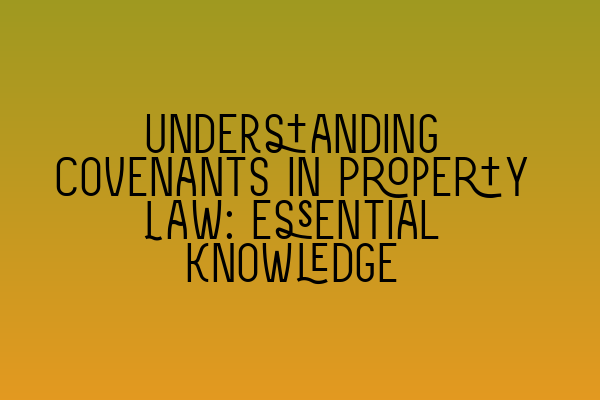Understanding Covenants in Property Law: Essential Knowledge
In the realm of property law, covenants play a significant role in shaping the rights and obligations associated with land ownership. Whether you are a homeowner, landlord, or tenant, having a solid grasp of covenants is essential to ensure that you are fully aware of your legal responsibilities. In this blog post, we will delve into the intricacies of covenants, providing you with the necessary knowledge to navigate the complexities of property law.
What are Covenants?
Covenants are legal agreements or promises between parties regarding the use and enjoyment of land. These agreements can be express or implied and are typically contained within deeds, leases, or other legal documents associated with property transfers. Covenants are binding on both the original parties to the agreement and their successors, meaning they transfer from one property owner to the next.
Types of Covenants
There are two main types of covenants: positive covenants and restrictive covenants. Let’s take a closer look at each of these.
Positive Covenants
Positive covenants establish obligations on the party owning the burdened land to carry out certain actions. For example, a positive covenant might require the property owner to contribute to the maintenance and repair of a communal road or footpath. These covenants are designed to ensure the proper functioning and upkeep of shared amenities.
On the flip side, the party benefiting from a positive covenant is entitled to enforce it against the burdened landowner. This means that if the burdened landowner fails to fulfill their obligations, the party benefiting from the covenant can take legal action to enforce compliance.
Restrictive Covenants
Unlike positive covenants, restrictive covenants impose limitations on the use and development of land. These covenants are put in place to protect the value, character, and enjoyment of a particular area or property. Common examples of restrictive covenants include restrictions on building height, property extensions, or the type of activities that can be undertaken on the land.
Enforcement of restrictive covenants is typically carried out by the original party that created the covenant, as well as subsequent landowners who have the benefit of the covenant. These parties can seek an injunction or damages against any violation of the restrictive covenant. It is crucial to note that restrictive covenants can sometimes be modified or discharged through a legal process if the circumstances warrant it.
Key Considerations for Covenants
When dealing with covenants, there are several essential factors to keep in mind:
1. Running with the Land: Covenants are said to “run with the land,” meaning they bind successors to the original parties who made the covenant. Therefore, it is important to thoroughly investigate any existing covenants on a property you intend to purchase or lease.
2. Privity of Estate and Privity of Contract: To enforce a covenant, there must be a connection between the parties called “privity.” Privity of estate refers to a shared interest in the land, while privity of contract refers to a direct contractual relationship. Understanding these concepts is crucial when determining who has the right to enforce a covenant.
3. Modification and Discharge: In certain circumstances, it may be possible to modify or discharge a restrictive covenant through the Upper Tribunal (Lands Chamber). Seeking professional legal advice is crucial when considering any modification or discharge, as the process can be complex.
4. Planning Permission and Covenants: It is important to recognize that obtaining planning permission does not automatically discharge any restrictive covenants in place. Even if planning permission has been granted for a certain development, you may still need to seek the consent of the affected parties with the benefit of the covenant.
Conclusion
In summary, covenants play a significant role in property law, shaping the rights and obligations associated with land ownership. Whether you are a homeowner, landlord, or tenant, understanding covenants is vital to ensure compliance with legal requirements and to protect your rights. If you are unsure about any covenant affecting your property, seek the advice of a qualified property law solicitor who can provide expert guidance tailored to your specific situation.
If you are preparing for exams in property law, make sure to check out our related articles for valuable resources and courses:
– SQE 1 Practice Exam Questions
– SQE 1 Practice Mocks FLK1 FLK2
– SQE 2 Preparation Courses
– SQE 1 Preparation Courses
– SRA SQE Exam Dates
Remember, staying informed and knowledgeable about covenants is crucial for anyone involved in the property industry. Arm yourself with the essential knowledge and seek professional guidance when necessary to ensure a smooth and successful property ownership journey.
